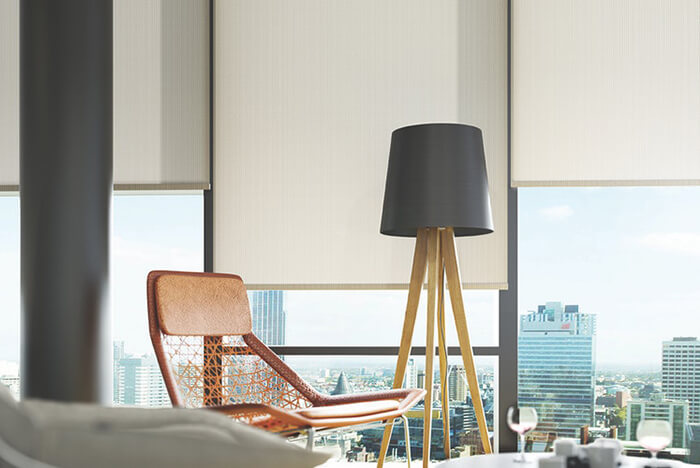What are Solar Shades?

As their name suggests, solar shades are a window treatment that helps to block out the sun’s rays. They are usually made of UV-resistant fabric and can be manually operated or motorized. Solar shades are meant to reduce hazardous sunlight while still allowing you to see outside.
There are several reasons why solar shades might be the right choice for your home.
- They can help reduce your energy costs by keeping your home cooler in the summer and warmer in the winter.
- They provide privacy and can help to protect your furnishings from fading in the sun.
- They are available in a variety of solar shade fabrics and styles to complement your décor.
What is Solar Shade Openness or VLT?
The openness of a solar shade refers to the amount of light that is able to pass through the fabric. The openness is measured as a percentage, and the lower the number, the more light is blocked. When there is a low openness factor, the cloth is more tightly woven, resulting in less visibility through the shade and greater light control. A high openness factor is characterized by a looser weave that allows for greater visibility.
Visible Light Transmission (VLT) is a measure of the amount of visible light that can pass through the fabric. It is usually measured on a scale from 1% to 100%. The higher the number, the more light will be allowed in. A VLT of 1% will block most of the light, while a VLT of 100% will allow all the light in.
- A low VLT of (1%-5%) will block more light and deliver a higher level of privacy, but it will also not allow for a very clear view.
- A medium VLT of (6-10%) will allow for a better view and give some protection against UV rays that could cause damage to your furniture and hardwood floors.
- A high VLT of (11-14%) gives you the best visibility and excellent glare protection.
Solar Heat Gain Coefficient
Solar Heat Gain Coefficient or SHGC is a measure of the amount of heat that is able to pass through the fabric. The lower the number, the less heat will be able to pass through. A SHGC of 0 means that no heat can pass through, while an SHGC of 1 means that all the heat can pass through.
Solar shades cannot keep cold out in the winter, but they can reflect heat back in, making it easier to maintain a comfortable temperature in your home. Solar shades can keep your home cooler by blocking out some of the sun’s rays in the summer.
Solar Shade Privacy
Solar shades provide daytime privacy and may prevent others from seeing into your home. Of all the solar shade openness factors, 1% offers the most privacy since it has the tightest weave. If you want a lot of privacy and light control, you may want to consider another option like roller blinds. You can also layer solar shades with other shades or drapes to provide more light filtering during the day and better nighttime privacy.
Choose the Right Solar Shade Fabric
The color of your solar shades can affect the level of privacy they provide and the amount of light that can pass through. Darker colors will block more light and provide more privacy, while lighter colors reflect heat better, allow more light, and offer less privacy. Lighter colors can also be a better option for smaller windows or if you want to brighten up a room. Darker color options are generally better for larger windows and excellent at reducing annoying glares.
Motorized Solar Shades vs. Manual Solar Shades
Motorized solar window shades are operated by a motor controlled by a switch or a remote. This type of shade is perfect for large windows since it can be opened and closed easily with the simple touch of a button.
Manual solar window shades are operated by a cord pulled to open and close the shade. This type of shade is a better choice if you are on a budget as it is not as expensive as motorized shades.
Cleaning Solar Shades
Solar shades should be dusted or vacuumed regularly to remove dirt or debris. If the shade is stained, you can use a damp cloth to clean it. Be sure to wring out the cloth well before cleaning the shade, as you don’t want any excess water to get behind the fabric and cause damage.
If the shade is very dirty, you can spot clean it with a mild soap and water solution. Again, be sure to wring out the cloth well before cleaning the shade. You should never use harsh chemicals or abrasive cleaners on solar shades, as this can damage the fabric and shorten the life of the shade.
What to Consider When Choosing Solar Shades
While Solar shades are a great option for some windows, they may not work for every window in your home or in every room. Solar shades are the best option for any commercial application. They can be used for residential, but there is no privacy for bedrooms and bathrooms, they are used to filter light and great for windows with a view that you want to maintain. Privacy will be impacted at night when lights are on inside the house. You may need to consider a different shade option for more privacy, like a blackout blind.
Solar shades are an excellent way to control the amount of light and heat that enters your home. Additionally, they provide UV protection that preserves the lifetime of your furniture and flooring. If you live in the Denver or Greenwood Village areas and need help deciding which type of solar shade would best suit your needs, contact Wei Wei Drapery Inc today! You can reach us at (303) 292-1036 or by email at tommy@weisds.com.

